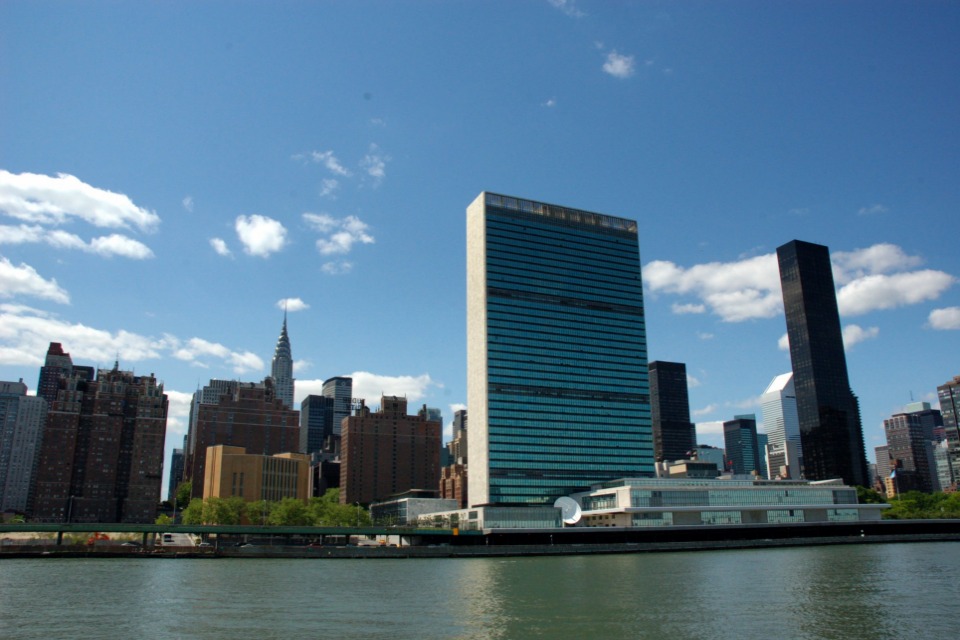"70 years ago, the UN Charter established the three founding pillars of the UN system: peace and security, human rights, and development."
Statement by Ambassador Mark Lyall Grant of the UK Mission to the UN at the Security Council Open Debate on the Maintenance of International Peace and Security

Thank you Mr President for convening this debate and for chairing it in person. I also thank the Secretary-General for his thoughtful briefing this morning.
Seventy years ago, the UN Charter established the three founding pillars of the UN system: peace and security, human rights, and development. Since 1945 these pillars have provided the framework for this Council to tackle challenges our predecessors could never have foreseen. But those three pillars still remain relevant today; and that is testament to their enduring value.
Mr President,
Interstate conflict remains a threat to international peace and security, as Russia’s illegal annexation of Crimea and destabilisation of Eastern Ukraine graphically demonstrate.
And threats are no longer confined to disputes between nation states, as the UN’s founders first conceived. These threats now exist irrespective of borders; in deep rooted ethnic and religious divisions, in violent non-state actors and terrorists, and where governments fail to abide by the rule of law and disregard the human rights of their citizens.
These threats now undermine the sovereignty of states in a way we have never seen before. If left unaddressed, legitimate grievances can quickly turn to violence and disorder. We must recognise that preventative action and support from this Council can bolster sovereignty by helping states to address these issues. We must utilise all of the tools at our disposal in order to do so.
Peacekeeping is one such tool, and is a strong example of the flexibility of this Council in implementing the UN Charter. There is no mention of peacekeeping in the Charter and yet today there are over 120,000 military and civilian personnel keeping the peace and protecting civilians on four continents, many in partnership with the African Union or the European Union. This year we have the opportunity to further improve UN peacekeeping. The Peace Operations Review will consider more effective protection of civilians, including better prevention of sexual violence. And in this 15th anniversary year of resolution 1325 on women, peace and security, we must recognise the disproportionate effect of conflict on women, and the important role of women in peacebuilding.
Mr President,
Over the past 70 years as the Secretary-General spelt out, respect for human rights has become increasingly central to maintaining international peace and security. Last year, resolution 2171 affirmed that patterns of human rights violations and abuses can act as early warning signs for impending or escalating conflicts. As we look ahead to the next 70 years, we must embrace a re-conception of international security; one that recognises that human rights are integral to this Council’s work on conflict prevention.
The consequences of not doing so can be seen in the streets of Aleppo, in the camps of Yarmouk, and in the rise of ISIL. When individual states can no longer ensure respect for human rights, they put their countries at risk from conflict, and international peace and security is threatened. In these instances, the Charter is clear on this Council’s responsibility to intervene in matters that would normally fall within domestic jurisdiction.
Ending impunity for human rights violations and abuses is also paramount to help reconcile communities and aid the settlement of disputes. No one can be above the law, and the International Criminal Court and the International Court of Justice have important roles to play. The United Kingdom has long accepted the compulsory jurisdiction of the ICJ – but is the only permanent member of this Council to continuously do so. We urge others to follow suit.
Mr President,
We have a historic opportunity this year to tackle the causes of poverty through the Post 2015 development framework. We support an agenda that will leave no one behind and will respect the equal rights of men and women. Enshrining these principles in the framework can only further our work on human rights, and in the long term, ensure fair and inclusive economies and societies.
The United Kingdom is proud to be investing 0.7% of our gross national income on overseas aid. We are the only G20 country to do so. As my Prime Minister, David Cameron, has said, this aid fosters a ‘golden thread of development’ which allows countries to prosper, and to avoid conflict. It helps create inclusive institutions, open societies and economies, and maintain the rule of law. The perils of not doing so can be seen in the events of the Arab Spring; the aftermath of which still undermines international peace and security today.
Mr President,
Let me conclude with the words of former Secretary General Kofi Annan. He argued that “we will not enjoy security without development, [nor] enjoy development without security, and we will not enjoy either without respect for human rights.” The United Kingdom fully endorses these words. The three pillars of the Charter are greater than the sum of their individual parts. They support each other, and success in one fosters success in the others. We cannot pick and choose which pillars this Council supports, nor can we focus on one to the detriment of the others. To do so would be to ignore the lessons of the past 70 years, and to invite future conflict.
I thank you.